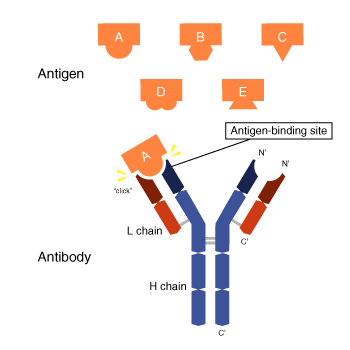This site is for customers in Asia.
Customers in China & other regions, please go to Global page.
 Antibodies are proteins produced and secreted by B cells. They bind to foreign substances that invade the body, such as pathogens.
Antibodies are proteins produced and secreted by B cells. They bind to foreign substances that invade the body, such as pathogens.
The term “antibody” refers to its function, which is to bind to an antigen. Another name for this protein molecule is immunoglobulin (abbreviated Ig).
Antibodies are Y-shaped molecules, consisting of two heavy chains (H chains) and two light chains (L chains) arranged as shown in the diagram on the right.
An antigen binds to the antigen-binding site at the tip of the “Y.” An important feature is that each antibody recognizes a specific antigen as illustrated in the diagram. This is called "antibody specificity".(Details are described below.)



